英国`
- 格式:doc
- 大小:387.50 KB
- 文档页数:41
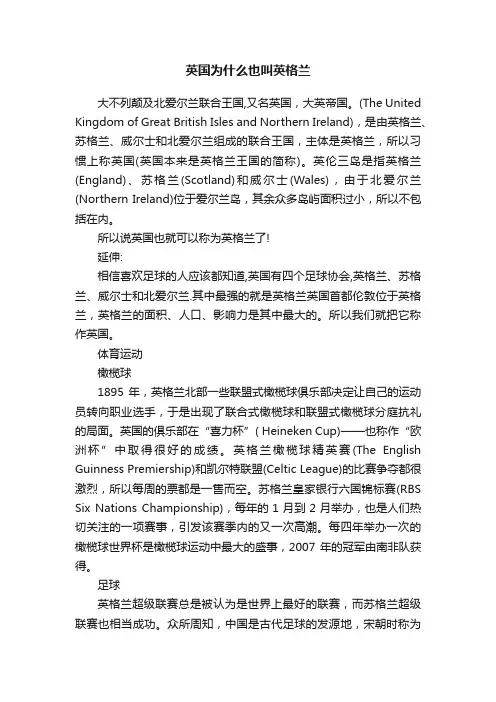
英国为什么也叫英格兰大不列颠及北爱尔兰联合王国,又名英国,大英帝国。
(The United Kingdom of Great British Isles and Northern Ireland),是由英格兰、苏格兰、威尔士和北爱尔兰组成的联合王国,主体是英格兰,所以习惯上称英国(英国本来是英格兰王国的简称)。
英伦三岛是指英格兰(England)、苏格兰(Scotland)和威尔士(Wales),由于北爱尔兰(Northern Ireland)位于爱尔兰岛,其余众多岛屿面积过小,所以不包括在内。
所以说英国也就可以称为英格兰了!延伸:相信喜欢足球的人应该都知道,英国有四个足球协会,英格兰、苏格兰、威尔士和北爱尔兰.其中最强的就是英格兰英国首都伦敦位于英格兰,英格兰的面积、人口、影响力是其中最大的。
所以我们就把它称作英国。
体育运动橄榄球1895年,英格兰北部一些联盟式橄榄球俱乐部决定让自己的运动员转向职业选手,于是出现了联合式橄榄球和联盟式橄榄球分庭抗礼的局面。
英国的俱乐部在“喜力杯”( Heineken Cup)——也称作“欧洲杯”中取得很好的成绩。
英格兰橄榄球精英赛(The English Guinness Premiership)和凯尔特联盟(Celtic League)的比赛争夺都很激烈,所以每周的票都是一售而空。
苏格兰皇家银行六国锦标赛(RBS Six Nations Championship),每年的1月到2月举办,也是人们热切关注的一项赛事,引发该赛季内的又一次高潮。
每四年举办一次的橄榄球世界杯是橄榄球运动中最大的盛事,2007年的冠军由南非队获得。
足球英格兰超级联赛总是被认为是世界上最好的联赛,而苏格兰超级联赛也相当成功。
众所周知,中国是古代足球的发源地,宋朝时称为“蹴鞠”。
英国则是现代足球的发源地。
1848年,现代足球运动的第一个文字形式的规则《剑桥规则》诞生了。
1863年12月1日,一帮剑桥大学的贵族投票最终促成了现代足球规则的诞生,现代足球随即发源于剑桥大学的草坪上。
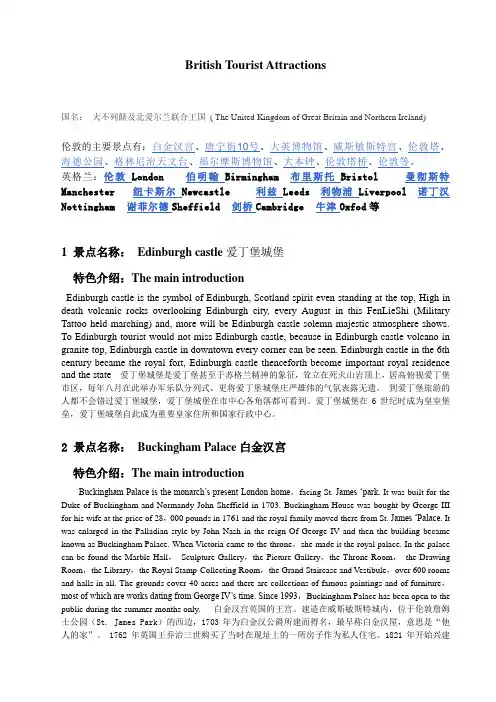
British Tourist Attractions国名:大不列颠及北爱尔兰联合王国( The United Kingdom of Great Britain and Northern Ireland)伦敦的主要景点有:白金汉宫、唐宁街10号、大英博物馆、威斯敏斯特宫、伦敦塔、海德公园、格林尼治天文台、福尔摩斯博物馆、大本钟、伦敦塔桥、伦敦等。
英格兰:伦敦London伯明翰Birmingham布里斯托Bristol曼彻斯特Manchester 纽卡斯尔Newcastle利兹Leeds利物浦Liverpool诺丁汉Nottingham 谢菲尔德Sheffield 剑桥Cambridge 牛津Oxfod等1 景点名称:Edinburgh castle爱丁堡城堡特色介绍:The main introductionEdinburgh castle is the symbol of Edinburgh, Scotland spirit even standing at the top, High in death volcanic rocks overlooking Edinburgh city, every August in this FenLieShi (Military Tattoo held marching) and, more will be Edinburgh castle solemn majestic atmosphere shows. To Edinburgh tourist would not miss Edinburgh castle, because in Edinburgh castle volcano in granite top, Edinburgh castle in downtown every corner can be seen. Edinburgh castle in the 6th century became the royal fort, Edinburgh castle thenceforth become important royal residence and the state爱丁堡城堡是爱丁堡甚至于苏格兰精神的象征,耸立在死火山岩顶上,居高俯视爱丁堡市区,每年八月在此举办军乐队分列式,更将爱丁堡城堡庄严雄伟的气氛表露无遗。
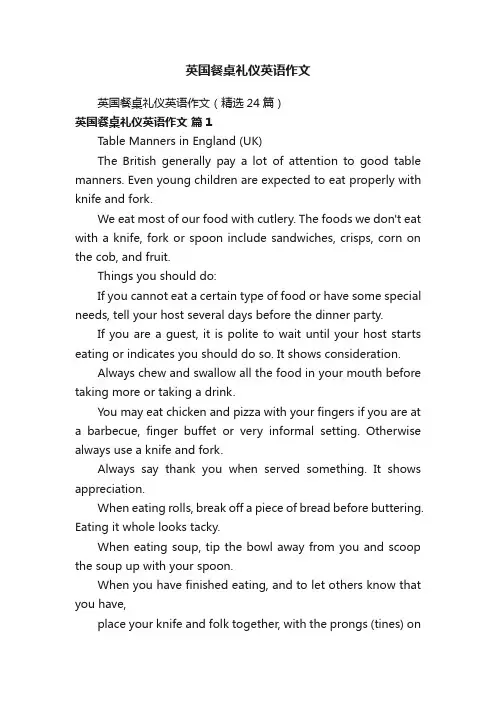
英国餐桌礼仪英语作文英国餐桌礼仪英语作文(精选24篇)英国餐桌礼仪英语作文篇1Table Manners in England (UK)The British generally pay a lot of attention to good table manners. Even young children are expected to eat properly with knife and fork.We eat most of our food with cutlery. The foods we don't eat with a knife, fork or spoon include sandwiches, crisps, corn on the cob, and fruit.Things you should do:If you cannot eat a certain type of food or have some special needs, tell your host several days before the dinner party.If you are a guest, it is polite to wait until your host starts eating or indicates you should do so. It shows consideration.Always chew and swallow all the food in your mouth before taking more or taking a drink.You may eat chicken and pizza with your fingers if you are at a barbecue, finger buffet or very informal setting. Otherwise always use a knife and fork.Always say thank you when served something. It shows appreciation.When eating rolls, break off a piece of bread before buttering. Eating it whole looks tacky.When eating soup, tip the bowl away from you and scoop the soup up with your spoon.When you have finished eating, and to let others know that you have,place your knife and folk together, with the prongs (tines) onthe fork facing upwards, on your plate.In a restaurant, it is normal to pay for your food by putting your money on the plate the bill comes on.Things you should not do:Never lick or put your knife in your mouth.It is impolite to start eating before everyone has been served unless your host says that you don't need to wait.Never chew with your mouth open. No one wants to see food being chewed or hearing it being chomped on.It is impolite to have your elbows on the table while you are eating.Don't reach over someone's plate for something, ask for the item to be passed.Never talk with food in your mouth.It is impolite to put too much food in your mouth.Never use your fingers to push food onto your spoon or fork.It is impolite to slurp your food or eat noisily.Never blow your nose on a napkin (serviette). Napkins are for dabbing your lips and only for that.Never take food from your neighbours plate.Never pick food out of your teeth with your fingernails.Things that are ok to do:It is ok to eat and drink something while walking down the street, unless you want to seem posh.It is ok to pour your own drink when eating with other people, but it is more polite to offer pouring drinks to the people sitting on either side of you.It is ok to put milk and sugar in your tea and coffee or to drink them both without either.I am not used to eating with a knife and fork. What do I needto know?We eat continental style, with fork in the left hand and the knife in the right (or the other way round if you are left handed). At the top of your plate will be a dessert spoon and dessert fork.If you are eating at a formal dinner party, you will come across many knives and forks. Start with the utensils on the outside and work your way inward with each subsequent course How to eat with a knife and fork in EnglandThe fork is held in the left hand and the knife in the right.If you have a knife in one hand, it is wrong to have a fork in the other with the prongs (tines) pointed up.Hold your knife with the handle in your palm and your folk in the other hand with the prongs pointing downwards.英国餐桌礼仪英语作文篇2The Role of Manners?There is not much call for a complete working knowledge of table manners in America today. Many families only gather all at once around the dinner table at holiday feasts, and most restaurants are too casual to require, or even to allow for, more than basic good table manners. If, having dropped his napkin, a diner at a bistro were to attempt to practice proper etiquette by signaling a member of the staff to bring a fresh one, he would probably have to do without a napkin at all. Try as he might to make eye contact and indicate the nature of the problem with a subtle wiggle of the eyebrow and downward flicker of the glance, he is likely to succeed only in causing his date to think he is making a play for the server. Although strict good manners forbid placing a used eating utensil back on the table, the server removing a plate on which a fork has quite properly been positioned "pointing at 11 o'clock" might just plop that item backwhere it started, making more of a clatter than if the diner had simply done it herself.From time to time -- perhaps at an important business dinner, a romantic date at an expensive restaurant, or a first dinner with the family of the person who may be "the One" -- it is necessary to display a more sophisticated knowledge of table etiquette. This is not difficult, once you have mastered the basics. Anyone armed with this core knowledge and the ability to adapt smoothly to the situation at hand will be able to handle even the most formal event. The goal is not, after all, to demonstrate utter mastery of the most arcane details of etiquette (which would be quite difficult considering the wide variations of customs in different cultures and from generation to generation), but rather to behave with graciousness and poise at the table.Mastering the BasicsMuch of the difficulty encountered in learning table manners derives from the struggle to master the ritual handling of the various tools involved. In order to display the right social veneer, it is necessary to sit at the table with elegant ease and wield the utensils with aplomb. The diner who leaves the napkin folded on his plate until it obstructs the placement of his appetizer plate reveals his lack of training. The dinner party guest who observes with dismay the array of flatware on either side of her plate, need only take the time to learn the simple secret to the plan. There are, of course, a few tips and pitfalls to be aware of, as well as the occasional surprising item you can eat with your hands. Here is a quick guide which will help steer you through even the most formal of occasions.英国餐桌礼仪英语作文篇31) As soon as the hostess picks up her napkin,pick yours upand lay it on your lap. Sometimes a roll of bread is wrapped in it; if so, take it out and put it on your side plate.2) The Soup CourseDinner usually begins with soup. The largest spoon at your place is the soup spoon. It will be beside your plate at the right-hand side.3) The Fish CourseIf there is a fish course, it will probably follow the soup. There may be a special fork for the fish, or it may be similar to the meat fork. Often it is smaller.4) The Meat CourseThe main Course is usually served by the host himself, especially if it is a fowl or a roast which need to be carved. He will often ask each guest what piece he prefers, and it is quite proper to state your preference as to lean or fat, dark or light.5) Using Knife and ForkIf you have English and American friends you will notice a few differences in their customs of eating. For the main or meat curse, the English keep the fork in the left hand, point curved downward, and bring the food to the mouth either by sticking the points onto it or in the case of soft vegetables, by placeing it firmly on the fork in this position with the knife. Americans carve the meat in the same position, then lay down the knife and taking the fork in the right hand with the point turned up, push it under a small piece of food without the help of the knife and bring it to the mouth right-side-up.6) Helping Yourself and RefusingIf a servant passes food around, he will pass the dish in at your left hand so that you can conveniently serve yourself with your right hand. Never serve yourself while the dish is on yourright; it is then the turn of your neighbor on the right. It is polite to take some of everything that is passed to you. But if there is something you may not like, you may quietly say: "No ,thank you."7) Second HelpingsThe hostess may or may not ask if you would like a second helping, according to the formality of the meal. If she does and you accept it, you should pass your plate to her or to the servant with the knife and fork still lying on it.8) The Salad CourseA salad is eaten with a fork only held in the right hand with points turned up. There is usually a special one for the salad, a little smaller than the meat fork.9) Bread and ButterBread is taken in the fingers and laid on the side plate or the edge of the large plate, it is never take with a fork. Butter is taken from the butter dish with the butter knife and placed on the side plate, not on one's bread.10) Other Things on the TableWhen there are things on the middle of the table, such as bread, butter, jelly, pickles, nits, candies, you should not take any until the hostess ahs suggested that they be passed.。
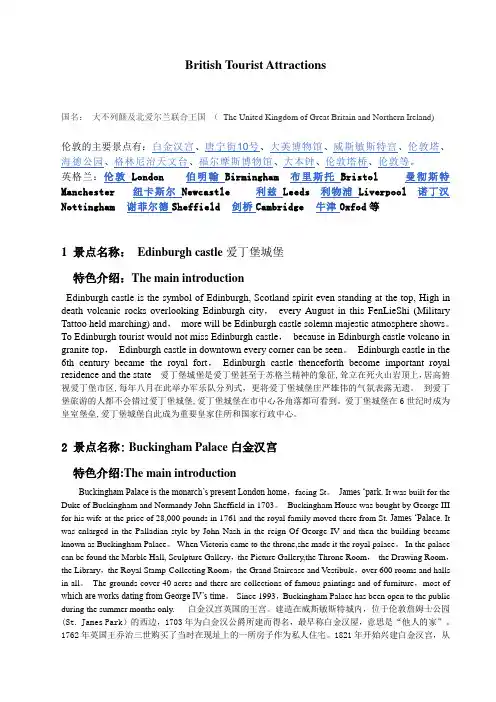
British Tourist Attractions国名:大不列颠及北爱尔兰联合王国(The United Kingdom of Great Britain and Northern Ireland)伦敦的主要景点有:白金汉宫、唐宁街10号、大英博物馆、威斯敏斯特宫、伦敦塔、海德公园、格林尼治天文台、福尔摩斯博物馆、大本钟、伦敦塔桥、伦敦等。
英格兰:伦敦London伯明翰Birmingham布里斯托Bristol曼彻斯特Manchester 纽卡斯尔Newcastle利兹Leeds利物浦Liverpool诺丁汉Nottingham 谢菲尔德Sheffield 剑桥Cambridge 牛津Oxfod等1 景点名称:Edinburgh castle爱丁堡城堡特色介绍:The main introductionEdinburgh castle is the symbol of Edinburgh, Scotland spirit even standing at the top, High in death volcanic rocks overlooking Edinburgh city,every August in this FenLieShi (Military Tattoo held marching) and,more will be Edinburgh castle solemn majestic atmosphere shows。
To Edinburgh tourist would not miss Edinburgh castle,because in Edinburgh castle volcano in granite top,Edinburgh castle in downtown every corner can be seen。
Edinburgh castle in the 6th century became the royal fort,Edinburgh castle thenceforth become important royal residence and the state爱丁堡城堡是爱丁堡甚至于苏格兰精神的象征,耸立在死火山岩顶上,居高俯视爱丁堡市区,每年八月在此举办军乐队分列式,更将爱丁堡城堡庄严雄伟的气氛表露无遗。
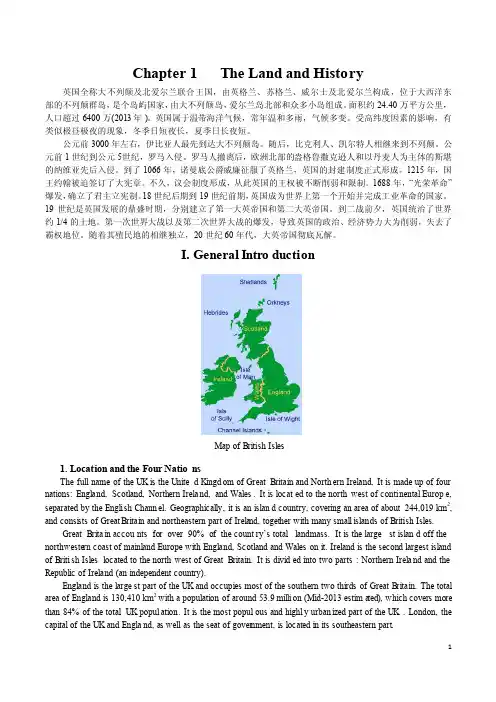
Chapt e r 1 The Land and Histo r y英国全称大不列颠及北爱尔兰联合王国,由英格兰、苏格兰、威尔士及北爱尔兰构成,位于大西洋东部的不列颠群岛,是个岛屿国家,由大不列颠岛,爱尔兰岛北部和众多小岛组成。
面积约24.40万平方公里,人口超过6400万(2013年)。
英国属于温带海洋气候,常年温和多雨,气候多变。
受高纬度因素的影响,有类似极昼极夜的现象,冬季日短夜长,夏季日长夜短。
公元前3000年左右,伊比亚人最先到达大不列颠岛。
随后,比克利人、凯尔特人相继来到不列颠。
公元前1世纪到公元5世纪,罗马入侵。
罗马人撤离后,欧洲北部的盎格鲁撒克逊人和以丹麦人为主体的斯堪的纳维亚先后入侵。
到了1066年,诺曼底公爵威廉征服了英格兰,英国的封建制度正式形成。
1215年,国王约翰被迫签订了大宪章。
不久,议会制度形成,从此英国的王权被不断削弱和限制。
1688年,―光荣革命‖爆发,确立了君主立宪制。
18世纪后期到19世纪前期,英国成为世界上第一个开始并完成工业革命的国家。
19世纪是英国发展的鼎盛时期,分别建立了第一大英帝国和第二大英帝国。
到二战前夕,英国统治了世界约1/4的土地。
第一次世界大战以及第二次世界大战的爆发,导致英国的政治、经济势力大为削弱,失去了霸权地位。
随着其殖民地的相继独立,20世纪60年代,大英帝国彻底瓦解。
I. Gener a l Intro d ucti o n1. Locat i on and the Four Natio n s The full name of the UK is the Unite d Kingd o m of Great Brita i n and North e rn Irela n d. It is made up of four natio n s: Engla n d, Scotl a nd, North e rn Irela n d, and Wales . It is locat e d to the north w est of conti n enta l Europ e , separ a ted by the Engli s h Chann e l. Geogr a phic a lly, it is an islan d count r y, cover i ng an area of about 244,019 km 2, and consi s ts of Great Brita i n and north e aste r n part of Irela n d, toget h er with many small islan d s of Briti s h Isles . Great Brita i n accou n ts for over 90% of the count r y’stotal landm a ss. It is the large s t islan d off the north w este r n coast of mainl a nd Europ e with Engla n d, Scotl a nd and Wales on it. Irela n d is the secon d large s t islan d of Briti s h Isles locat e d to the north w est of Great Brita i n. It is divid e d into two parts : North e rn Irela n d and the Repub l ic of Irela n d (an indep e nden t count r y).Engla n d is the large s t part of the UK and occup i es most of the south e rn two third s of Great Brita i n. The total area of Engla n d is 130,410 km 2 with a popul a tion of aroun d 53.9 milli o n (Mid-2013 estim a ted), which cover s morethan 84% of the total UK popul a tion . It is the most popul o us and highl y urban i zed part of the UK . Londo n , the capit a l of the UK and Engla n d, as well as the seat of gover n ment , is locat e d in its south e aste rn part.Map of Briti s h Isles Scotla nd is the second larges t and most mounta inous part of the UK in the northof GreatBritai n. Compar ed with that of Englan d, the popula tiondensit y is quitelow. Thereare only 5.3 millio n people with an area of 78,789 km2. Edinbu rgh, its larges t city, is the capita l of Scotla nd. Scotla nd is famous for its beauti ful natura l scener y, such as Scotti s h Highla nds1and Loch Ness2, as well as many histor icalplaces, like the Edinbu rgh Castle s.Walesis on the wester n side of centra l southe rn GreatBritai n. The totalarea of Walesis 20,779 km2, whichaccoun ts for 1/4 partsof the UK. It is also a mounta inous part of GreatBritai n, partic ularl y in the northand centra l region s. The southe ast region is the most builtup region of Wales, and the majori ty of its popula tionlive thereand a largepropor tionof its indust ry is basedthere. Its capita l city, Cardif f, is also in this region.Northe rn Irelan d lies in the northe ast of the island of Irelan d, coveri ng14,139 km2, whichconsti tutes 1/6 of the island. It is the smalle st part amongthe four nation s of the UK, as well as the second sparse ly popula ted part afterScotla nd. The capita l is Belfas t, the larges t city in Northe rn Irelan d both in popula tionand in area. It is the center for govern ment,econom ic, arts, higher educat ion, busine ss, law of Northe rn Irelan d. Additi onall y, it is the birthp laceof Titani c, and votedone of the world’stopdestin ation s.2. Climat eThe overal l climat e in the UK is temper ate mariti me, whichmeansthat it is mild with temper ature s neithe r much lowerthan 0℃ in winter nor much higher 32℃ in summer. Genera lly, the UK has warm summer s and cool winter s, with July and August as the warmes t month, and Januar y and Februa ry as the coldes t. Howeve r, due to the influe nce of Gulf Stream3, the summer s are cooler than thosein contin ent whilethe winter s are milder. Normal ly, the temper ature in summer is around20℃,with the high rarely goingabove30℃. The averag e temper ature in winter is around 0℃ and seldom go below-10℃ even in the most northe rn part of the countr y.Meanwh ile, sinceBritai n is an island countr y and surrou ndedby the sea, the climat e is consid erabl y change ablecompar ed with othercountr ies. Sincethe variab le climat e changi ng day to day, it is hard for people to predic t what the weathe r will be like the next day. Additi onall y, the unique geogra phica l positi on is also the reason for the dampne ss of the climat e. The rainfa ll is fairly distri buted throug houtthe year. Althou gh it does not rain everyday, it is always advisa ble for people to bringan umbrel la or waterp roofclothi ng everyday.II. Histor y1. The Foundi ng of the NationThe record ed histor y of the UK begins with the Romaninvasi on in 55BC. In 55 and 54BC, Britai n was twiceinvade d by Julius Caesar and his Romantroops. Howeve r, it was not until43AD that the Romanled by Claudi us I finall y succes sfull y invade d and Britai n became part of the RomanEmpire. The native Celtic were driven to the mounta in region s of Scotla nd and Wales, whichremain ed unconq uered by the Romans.The Romans have greatimpact on many aspect s of the Britis h cultur e. The Romancivili zatio n was introd ucedto the Britai n during this period. For exampl e, Romanstylebathsand temple s were built, cities like London and townswere constr ucted, and the system of govern mentwas also introd uced. With the declin e of the RomanEmpire, when the German ic troops attack ed Rome in 410 A.D., the Romans had to withdr aw in orderto protec t theirown nation, whichled to the end of Romanoccupa tion.Afterthe leaveof the Romans, threegroups of German ic tribes called the Jutes, the Angles and the Saxons came to Britai n from the Europe an contin ent in the mid-4th centur y. They conque red differ ent region s of Britai n:1Scotti sh Highla nds:苏格兰高地,是对苏格兰高地边界断层以西和以北的山地的称,被认为是欧洲风景最优美的地区。
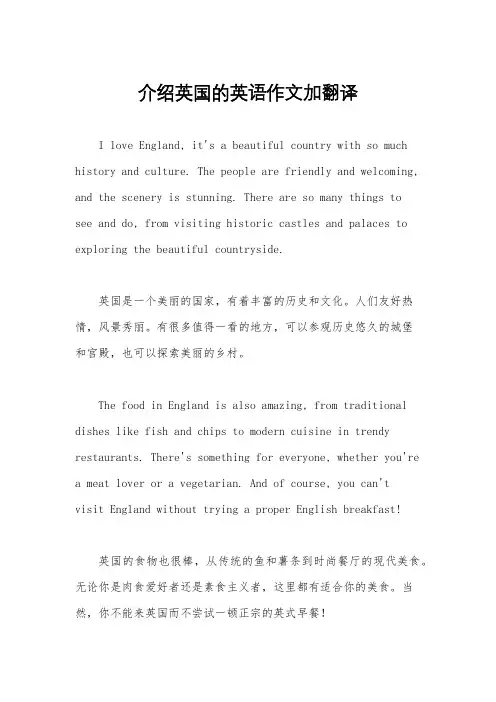
介绍英国的英语作文加翻译I love England, it's a beautiful country with so much history and culture. The people are friendly and welcoming, and the scenery is stunning. There are so many things tosee and do, from visiting historic castles and palaces to exploring the beautiful countryside.英国是一个美丽的国家,有着丰富的历史和文化。
人们友好热情,风景秀丽。
有很多值得一看的地方,可以参观历史悠久的城堡和宫殿,也可以探索美丽的乡村。
The food in England is also amazing, from traditional dishes like fish and chips to modern cuisine in trendy restaurants. There's something for everyone, whether you're a meat lover or a vegetarian. And of course, you can'tvisit England without trying a proper English breakfast!英国的食物也很棒,从传统的鱼和薯条到时尚餐厅的现代美食。
无论你是肉食爱好者还是素食主义者,这里都有适合你的美食。
当然,你不能来英国而不尝试一顿正宗的英式早餐!One of the things I love most about England is the language. English is spoken all over the world, and it's so important to learn it. The accents in England are so diverse, from the posh accents of the south to the strong accents of the north. It's so interesting to hear the different ways people speak.我最喜欢英国的一件事就是语言。
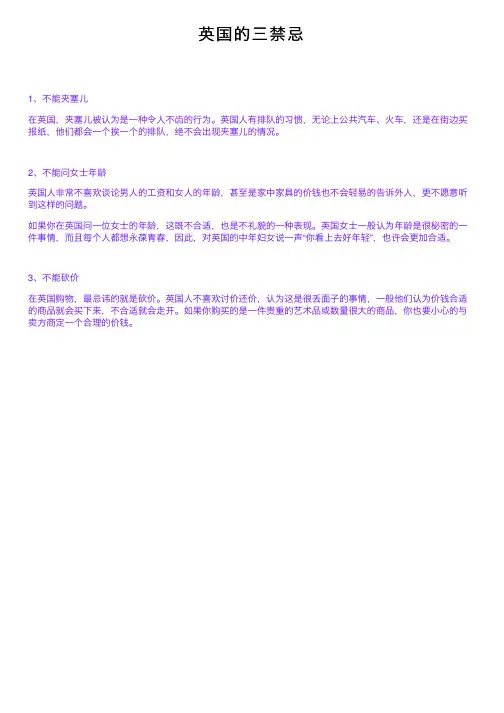
英国的三禁忌
1、不能夹塞⼉
在英国,夹塞⼉被认为是⼀种令⼈不齿的⾏为。
英国⼈有排队的习惯,⽆论上公共汽车、⽕车,还是在街边买报纸,他们都会⼀个挨⼀个的排队,绝不会出现夹塞⼉的情况。
2、不能问⼥⼠年龄
英国⼈⾮常不喜欢谈论男⼈的⼯资和⼥⼈的年龄,甚⾄是家中家具的价钱也不会轻易的告诉外⼈,更不愿意听到这样的问题。
如果你在英国问⼀位⼥⼠的年龄,这既不合适,也是不礼貌的⼀种表现。
英国⼥⼠⼀般认为年龄是很秘密的⼀件事情,⽽且每个⼈都想永葆青春,因此,对英国的中年妇⼥说⼀声“你看上去好年轻”,也许会更加合适。
3、不能砍价
在英国购物,最忌讳的就是砍价。
英国⼈不喜欢讨价还价,认为这是很丢⾯⼦的事情,⼀般他们认为价钱合适的商品就会买下来,不合适就会⾛开。
如果你购买的是⼀件贵重的艺术品或数量很⼤的商品,你也要⼩⼼的与卖⽅商定⼀个合理的价钱。
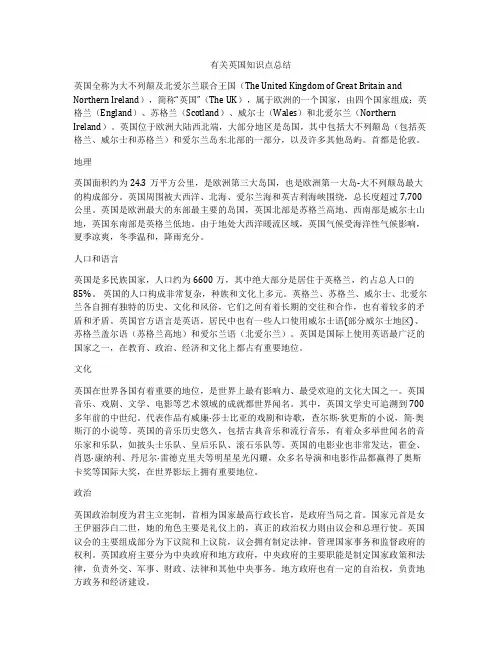
有关英国知识点总结英国全称为大不列颠及北爱尔兰联合王国(The United Kingdom of Great Britain and Northern Ireland),简称“英国”(The UK),属于欧洲的一个国家,由四个国家组成:英格兰(England)、苏格兰(Scotland)、威尔士(Wales)和北爱尔兰(Northern Ireland)。
英国位于欧洲大陆西北端,大部分地区是岛国,其中包括大不列颠岛(包括英格兰、威尔士和苏格兰)和爱尔兰岛东北部的一部分,以及许多其他岛屿。
首都是伦敦。
地理英国面积约为24.3万平方公里,是欧洲第三大岛国,也是欧洲第一大岛-大不列颠岛最大的构成部分。
英国周围被大西洋、北海、爱尔兰海和英吉利海峡围绕,总长度超过7,700公里。
英国是欧洲最大的东部最主要的岛国,英国北部是苏格兰高地、西南部是威尔士山地,英国东南部是英格兰低地。
由于地处大西洋暖流区域,英国气候受海洋性气候影响,夏季凉爽,冬季温和,降雨充分。
人口和语言英国是多民族国家,人口约为6600万,其中绝大部分是居住于英格兰,约占总人口的85%。
英国的人口构成非常复杂,种族和文化上多元。
英格兰、苏格兰、威尔士、北爱尔兰各自拥有独特的历史、文化和风俗,它们之间有着长期的交往和合作,也有着较多的矛盾和矛盾。
英国官方语言是英语,居民中也有一些人口使用威尔士语(部分威尔士地区)、苏格兰盖尔语(苏格兰高地)和爱尔兰语(北爱尔兰)。
英国是国际上使用英语最广泛的国家之一,在教育、政治、经济和文化上都占有重要地位。
文化英国在世界各国有着重要的地位,是世界上最有影响力、最受欢迎的文化大国之一。
英国音乐、戏剧、文学、电影等艺术领域的成就都世界闻名。
其中,英国文学史可追溯到700多年前的中世纪。
代表作品有威廉·莎士比亚的戏剧和诗歌,查尔斯·狄更斯的小说,简·奥斯汀的小说等。
英国的音乐历史悠久,包括古典音乐和流行音乐,有着众多举世闻名的音乐家和乐队,如披头士乐队、皇后乐队、滚石乐队等。
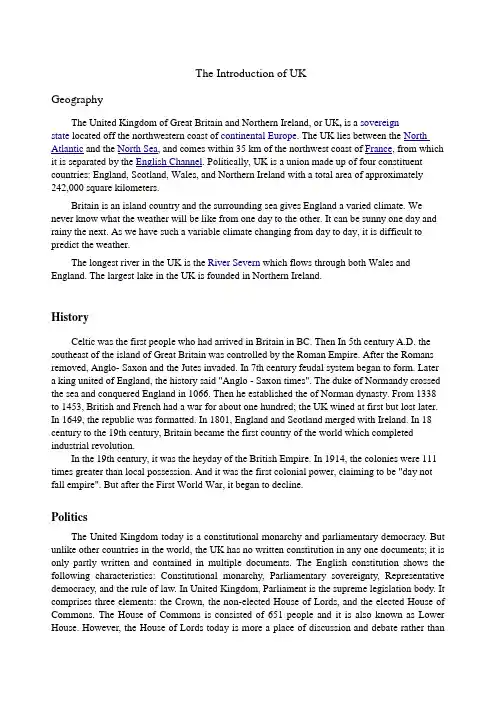
The Introduction of UKGeographyThe United Kingdom of Great Britain and Northern Ireland, or UK, is a sovereignstate located off the northwestern coast of continental Europe. The UK lies between the North Atlantic and the North Sea, and comes within 35 km of the northwest coast of France, from which it is separated by the English Channel. Politically, UK is a union made up of four constituent countries: England, Scotland, Wales, and Northern Ireland with a total area of approximately 242,000 square kilometers.Britain is an island country and the surrounding sea gives England a varied climate. We never know what the weather will be like from one day to the other. It can be sunny one day and rainy the next. As we have such a variable climate changing from day to day, it is difficult to predict the weather.The longest river in the UK is the River Severn which flows through both Wales and England. The largest lake in the UK is founded in Northern Ireland.HistoryCeltic was the first people who had arrived in Britain in BC. Then In 5th century A.D. the southeast of the island of Great Britain was controlled by the Roman Empire. After the Romans removed, Anglo- Saxon and the Jutes invaded. In 7th century feudal system began to form. Later a king united of England, the history said "Anglo - Saxon times". The duke of Normandy crossed the sea and conquered England in 1066. Then he established the of Norman dynasty. From 1338 to 1453, British and French had a war for about one hundred; the UK wined at first but lost later. In 1649, the republic was formatted. In 1801, England and Scotland merged with Ireland. In 18 century to the 19th century, Britain became the first country of the world which completed industrial revolution.In the 19th century, it was the heyday of the British Empire. In 1914, the colonies were 111 times greater than local possession. And it was the first colonial power, claiming to be "day not fall empire". But after the First World War, it began to decline.PoliticsThe United Kingdom today is a constitutional monarchy and parliamentary democracy. But unlike other countries in the world, the UK has no written constitution in any one documents; it is only partly written and contained in multiple documents. The English constitution shows the following characteristics: Constitutional monarchy, Parliamentary sovereignty, Representative democracy, and the rule of law. In United Kingdom, Parliament is the supreme legislation body. It comprises three elements: the Crown, the non-elected House of Lords, and the elected House of Commons. The House of Commons is consisted of 651 people and it is also known as Lower House. However, the House of Lords today is more a place of discussion and debate rather thanone of substantial power.The English government is instituted at three levels: central government, country government and district government. Since 1945, the British party politics has been a two-party system of government in the UK Parliament with power being held by either the Conservative Party or the Labor Party.EconomyThe economy of United Kingdom was once at the forefront in the world during the 19th –century Industrial Revolution. UK as a member of the European Union still owns one of the most developed economies. And it has the second largest economy in European and the fifth largest gross domestic product in the world. The capital, London, is along with New York City, one of the two largest financial centres in the world.Then let’s talk about the indust ries of UK.First in energy, primary energy production accounts for 10 percent of the UK GDP, one of the highest shares of any industrial nation. About the agriculture, 77percetn of the land is used for agriculture but only 24 percent of this land is used to grow crops, while other places are only suitable for grazing. Today, the UK remains an important manufacturing country, although it imports large quantities of manufacturing goods from overseas.CultureBritish society today is known for its multicultural climate, which gives strength and diversity to all aspects of British culture. This , along with increased free time and disposable(可自由使用的) money, allows people to organize their private life in different activities in many fields, including leisure, arts, sports, and media. Their lifestyle are not just the expressions of individuals, but more often the values of social groups by age, gender, and class, and more importantly, are associated with national identities.British people prefer to spend their leisure time within the home. Holidays and where to spend them have also become an important part of British life. Sports also play a prominent role in British life such as football, tennis, golf. Except them, British also have artistic activities and media activities. Their life is colorful.The UK national flag is the Union Flag and its national anthem is God Save the King/Queen.GeographyThe United Kingdom of Great Britain and Northern Ireland, or UK, is a sovereignstate located off the northwestern coast of continental Europe. The UK lies between the North Atlantic and the North Sea, and comes within 35 km of the northwest coast of France, from which it is separated by the English Channel. Politically,the UK is a union made up of four constituent countries: England, Scotland, Wales, and Northern Ireland with a total area of approximately 242,000 square kilometers.英国包括大不列颠和北爱尔兰组成,它也是一个主权国家位于西北海岸的欧洲大陆。
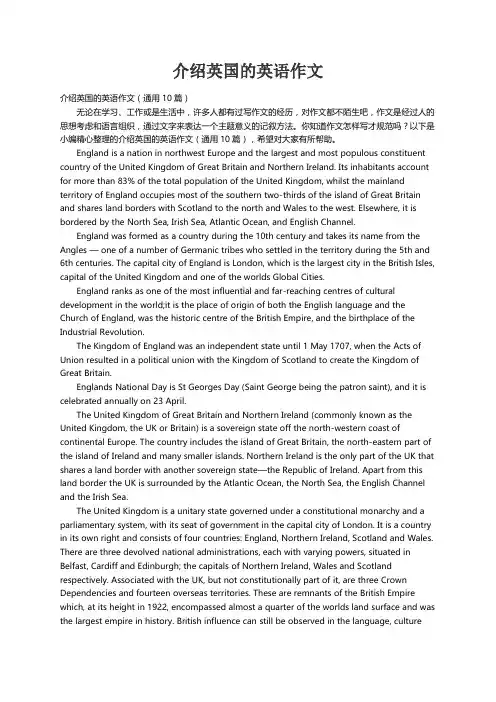
介绍英国的英语作文介绍英国的英语作文(通用10篇)无论在学习、工作或是生活中,许多人都有过写作文的经历,对作文都不陌生吧,作文是经过人的思想考虑和语言组织,通过文字来表达一个主题意义的记叙方法。
你知道作文怎样写才规范吗?以下是小编精心整理的介绍英国的英语作文(通用10篇),希望对大家有所帮助。
England is a nation in northwest Europe and the largest and most populous constituent country of the United Kingdom of Great Britain and Northern Ireland. Its inhabitants account for more than 83% of the total population of the United Kingdom, whilst the mainland territory of England occupies most of the southern two-thirds of the island of Great Britain and shares land borders with Scotland to the north and Wales to the west. Elsewhere, it is bordered by the North Sea, Irish Sea, Atlantic Ocean, and English Channel.England was formed as a country during the 10th century and takes its name from the Angles — one of a number of Germanic tribes who settled in the territory during the 5th and 6th centuries. The capital city of England is London, which is the largest city in the British Isles, capital of the United Kingdom and one of the worlds Global Cities.England ranks as one of the most influential and far-reaching centres of cultural development in the world;it is the place of origin of both the English language and the Church of England, was the historic centre of the British Empire, and the birthplace of the Industrial Revolution.The Kingdom of England was an independent state until 1 May 1707, when the Acts of Union resulted in a political union with the Kingdom of Scotland to create the Kingdom of Great Britain.Englands National Day is St Georges Day (Saint George being the patron saint), and it is celebrated annually on 23 April.The United Kingdom of Great Britain and Northern Ireland (commonly known as the United Kingdom, the UK or Britain) is a sovereign state off the north-western coast of continental Europe. The country includes the island of Great Britain, the north-eastern part of the island of Ireland and many smaller islands. Northern Ireland is the only part of the UK that shares a land border with another sovereign state—the Republic of Ireland. Apart from this land border the UK is surrounded by the Atlantic Ocean, the North Sea, the English Channel and the Irish Sea.The United Kingdom is a unitary state governed under a constitutional monarchy and a parliamentary system, with its seat of government in the capital city of London. It is a country in its own right and consists of four countries: England, Northern Ireland, Scotland and Wales. There are three devolved national administrations, each with varying powers, situated in Belfast, Cardiff and Edinburgh; the capitals of Northern Ireland, Wales and Scotland respectively. Associated with the UK, but not constitutionally part of it, are three Crown Dependencies and fourteen overseas territories. These are remnants of the British Empire which, at its height in 1922, encompassed almost a quarter of the worlds land surface and was the largest empire in history. British influence can still be observed in the language, cultureand legal systems of many of its former territories.The UK is a developed country and has the worlds sixth-largest economy by nominal GDP and seventh-largest economy by purchasing power parity. It was the worlds first industrialized country and the worlds foremost power during the 19th and early 20th centuries although the economic and social cost of two world wars and the decline of its empire in the latter half of the 20th century diminished its leading role in global affairs. The UK nevertheless remains a great power with leading economic, cultural, military, scientific and political influence. It is a member state of the European Union, a permanent member of the United Nations Security Council, and is also a member of: the Commonwealth of Nations, G8, G20, NATO, the OECD, the Council of Europe and the World Trade Organization.The United Kingdom of Great Britain and Northern Ireland uses as its national flag the royal banner known as the Union Flag or, popularly, Union Jack. It consists of the red cross of Saint George (patron saint of England), edged in white, superimposed on the Cross of St Patrick (patron saint of Ireland), which are superimposed on the Saltire of Saint Andrew (patron saint of Scotland). Wales, however, is not represented in the Union Flag by Wales patron saint, Saint David as at the time the flag was designed Wales was part of the Kingdom of England."God Save the Queen" (alternatively "God Save the King") is an anthem used in a number of Commonwealth realms and British Crown Dependencies. The words of the song, like its title, are adapted to the gender of the current monarch, with "King" replacing "Queen", "he" replacing "she", and so forth, when a king reigns.The official language is English, and other recognised regional languages are Irish, Ulster Scots, Scottish Gaelic, Scots, Welsh, Cornish.London is the capital city of England and the United Kingdom, the largest metropolitan area in the United Kingdom and the largest urban zone in the European Union by most measures. London is a leading global city, with strengths in the arts, commerce, education, entertainment, fashion, finance, healthcare, media, professional services, research and development, tourism and transport all contributing to its prominence.London contains four World Heritage Sites: the Tower of London; Kew Gardens; the site comprising the Palace of Westminster, Westminster Abbey and St Margarets Church; and the historic settlement of Greenwich (in which the Roya l Observatory marks the Prime Meridian (0° longitude) and GMT). Other famous landmarks include Buckingham Palace, the London Eye, Piccadilly Circus, 30 St Mary Axe ("The Gherkin"), St Pauls Cathedral, Tower Bridge and Trafalgar Square. London is home to numerous museums, galleries, libraries, sporting events and other cultural institutions including the British Museum, National Gallery, British Library, Wimbledon and 40 theatres.The Tower of London has played a prominent role in English history. It was besieged several times and controlling it has been important to controlling the country. The Tower has served variously as an armoury, a treasury, a menagerie, the home of the Royal Mint, a public records office, and the home of the Crown Jewels of the United Kingdom.In the late 15th century the castle was the prison of the Princes in the Tower. Under the Tudors, the Tower became used less as a royal residence, and despite attempts to refortifyand repair the castle its defences lagged behind developments to deal with artillery.The peak period of the castles use as a prison was the 16th and 17th centuries, when many figures who had fallen into disgrace, such as Elizabeth I before she became queen, were held within its walls. This use has led to the phrase "sent to the Tower". Despite its enduring reputation as a place of torture and death, popularised by 16th-century religious.British advocate "gentleman" and "Ladies style", and "Ladies first." In daily life, the British note instruments, dress smartly, the British A Gift is shaking hands. When dealing with people, pay attention to with honorifics "please", "thank you" and "sorry".English breakfast dish is very rich, there is a range eggs, cereal, bacon, ham, sausage, butter, jam, bread, milk, juice, coffee, etc., are generally welcomed by Western countries. In addition, the British like drinking tea, there are around 3 in the afternoon tea habit, as a British people to enjoy a cup of tea, but also as a social.Britain is a rich and varied, with international and multi-cultural society, to welcome students from all over the world come here to learn and to value their contributions.Britain is a tolerant, democratic society, where different political views and beliefs are respected. you will find many people wearing and eating habits and you do not have their own different major cities around the world have sales of snack food, meat from an islamic shop, the islamic meat from the shop. asia to sell fruit and rice kind of jewish food store to store, everything.In different towns and cities, the year has a variety of activities to celebrate the worlds major religious festivals and activities, for example, in the city of leicester at the stradivari outside the indian sub-section is the most spectacular festival of lights.Britain itself from england, scotland, wales and northern ireland, they have different characteristics and personality.Britain from all over the world to accept immigrants and refugees has a long history, many people have been here for permanent settlement. london may be the largest gathering of minority british city, other cities also have a large number of minority residents.All the worlds major religions are british. mosques, sikh temples, synagogues, churches and india fodou together with a variety of christian churches (anglican and roman catholic from the protestant and orthodox) co-exist.This diversity means that you will come to britain is easy to integrate into britains multi-ethnic society. you will also come from different religious and ethnic groups and people contacts, enhance understanding of different cultures.It rises in four headstreams (the Thames or Isis,Churn,Coln,and Leach) in the Cotswold Hills,E Gloucestershire,and flows generally eastward across S England and through London to the North Sea at The Nore.In its upper course—around and above Oxford—it is often called Isis.The Thames drains c.5,250 sq mi (13,600 sq km); its tributaries include theWindrush,Cherwell,Thame,Kennet,Wey,Mole,Lea,Roding,and Medway.It is joined by canals (including the Oxford,Thames and Severn,and Grand Junction) that cover a wide area.The river is navigable by barges to Lechlade,below which there are a number of locks.The Thames is tidal to Teddington; there is a 23-ft (7-m) difference between low and high tide at London Bridge.The part of the stream near London Bridge is known as the Pool.The main part of the port of London stretches from London Bridge to Blackwall.The Thames Conservancy Board was established in 1857; the docks and the tidal part of the river below Teddington have been administered by the Port of London Authority since 1908.Part of the river is of great beauty,is much used for boating,and is still popular for fishing.The upper valley of the Thames is a broad,flat basin of alluvial clay soil,through which the river winds and turns constantly in all directions.At Goring Gap the valley narrows,separating the Chiltern Hills from the Berkshire Downs.The lower valley forms a second broad basin through which the Thames also meanders.The land around the river was formerly marshy,and the ancient roads were far from the river banks.In the Middle Ages the valley was very prosperous,with many religious houses and several large towns,including Reading and Windsor.Between Oxford and London,the valley is predominantly agricultural,with scattered villages; Reading is the only industrial town there.The Greater London conurbation along the rivers lower course is one of the most important industrial regions of Great Britain.Among the many interesting archaeological discoveries made in the valley are fossils of seashells and a human skull from the Paleolithic period.In London the river is crossed by 27 bridges,including the new London Bridge,Westminster Bridge,Waterloo Bridge,and Tower Bridge.There are two main tunnels under the river in London,and one between Dartford and Purfleet,as well as several footpaths and 5 railroad tunnels.In 1963 governmental efforts began to combat pollution of the waters through a series of rules and regulations.At parts along the river downstream flood barriers were constructed,which became operational in 1982,to prevent London from damage by North Sea gales.The englishman love to behave gentlemanly and the englishwoman love to behave ladily. they also show their respect to ladies. they always say" lady first". in their daily life. the english pay attention to their appearance. they dress neatly. they shake hands when they meet other. when they are with others, they usually say "please""thank you""sorry" and so on.The breakfast in britain is very rich. usually there are all kinds of egg products, oatmeal, bacon, ham, sausages, butter, jam, bread, milk, juice, coffee and so on. they are popular with the western countries. whats more, the english like drinking tea. they have the habit of drink afternoon tea at about 3 in the afternoon. they enjoy drinking tea and treat it as a kind of seeing friends.英国人崇尚“绅士风度”和“淑女风范”,讲究“女士优先”。
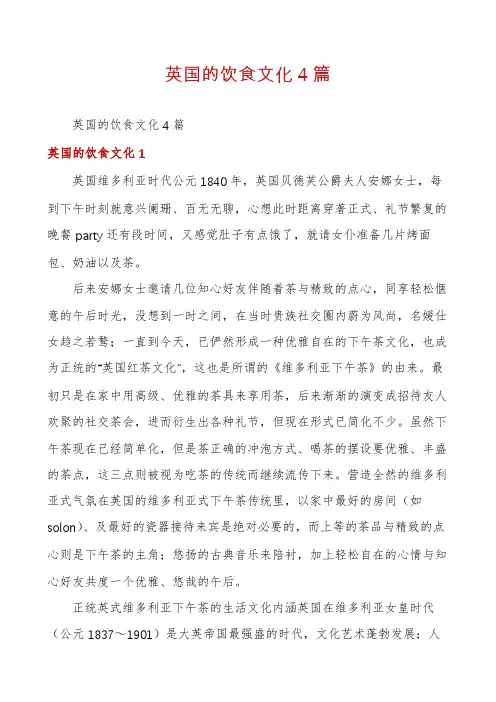
英国的饮食文化4篇英国的饮食文化4篇英国的饮食文化1英国维多利亚时代公元1840年,英国贝德芙公爵夫人安娜女士,每到下午时刻就意兴阑珊、百无无聊,心想此时距离穿著正式、礼节繁复的晚餐party还有段时间,又感觉肚子有点饿了,就请女仆准备几片烤面包、奶油以及茶。
后来安娜女士邀请几位知心好友伴随着茶与精致的点心,同享轻松惬意的午后时光,没想到一时之间,在当时贵族社交圈内蔚为风尚,名媛仕女趋之若鹜;一直到今天,已俨然形成一种优雅自在的下午茶文化,也成为正统的“英国红茶文化”,这也是所谓的《维多利亚下午茶》的由来。
最初只是在家中用高级、优雅的茶具来享用茶,后来渐渐的演变成招待友人欢聚的社交茶会,进而衍生出各种礼节,但现在形式已简化不少。
虽然下午茶现在已经简单化,但是茶正确的冲泡方式、喝茶的摆设要优雅、丰盛的茶点,这三点则被视为吃茶的传统而继续流传下来。
营造全然的维多利亚式气氛在英国的维多利亚式下午茶传统里,以家中最好的房间(如solon)、及最好的瓷器接待来宾是绝对必要的,而上等的茶品与精致的点心则是下午茶的主角;悠扬的古典音乐来陪衬,加上轻松自在的心情与知心好友共度一个优雅、悠哉的午后。
正统英式维多利亚下午茶的生活文化内涵英国在维多利亚女皇时代(公元1837~1901)是大英帝国最强盛的时代,文化艺术蓬勃发展;人们醉心于追求艺术文化的内涵及精致生活品味。
维多莉亚下午茶是一门综合的'艺术,简朴却不寒酸,华丽却不庸俗。
虽然喝茶的时间与吃的东西(指纯英式点心)是正统英式下午茶最重要的一环,但是少了好的茶品、磁器、音乐、甚至好心情,则喝下午茶就显得美中不足了。
随着时代的进步及茶类的种类繁多,不但下午茶的花样多,选择也多,如果利用一个午后,和亲密的朋友来段午后之约,何尝不是件赏心悦目的事。
英国的饮食文化2美国、印度、日本、英国的传统节日和饮食习惯是什么?美国:节日:国旗日,林肯纪念日,愚人节。
饮食习惯:美国人不吃动物内脏,吃生东西多,牛肉通常是6分熟的。
英国取得的巨大成就
英国是一个有着悠久历史和丰富文化的国家,它在历史上取得了许多巨大的成就。
以下是英国取得的一些重要成就:
1. 工业革命:英国是第一个经历了工业革命的国家,它的发展为全球经济带来了重大影响。
英国的纺织业、煤矿、钢铁和造船业等成为世界领先的行业。
2. 帝国主义:在19世纪和20世纪早期,英国建立了庞大的帝国,其领土范围涵盖了全球四分之一的土地和人口。
英国的殖民化活动为其带来了巨大的财富和政治影响力。
3. 文化贡献:英国以其文化贡献而闻名于世界。
英国的文学、音乐、戏剧等领域影响了全球。
莎士比亚、狄更斯、狄伦、披头士等都是英国文化的代表。
4. 政治制度:英国的政治制度被认为是世界上最成熟和最稳定的之一。
英国的民主制度和国会制度被许多其他国家采用,并成为了现代民主制度的典范。
5. 科学和技术:英国在科学和技术方面取得了重大成就。
英国的科学家和工程师发明了许多重要的发明和技术,包括蒸汽机、电动机、电视和计算机等。
这些成就证明了英国在历史上取得的巨大影响力和地位。
虽然英国现在已经不再是世界上最强大的国家之一,但它的历史和文化仍然为世界所瞩目和尊重。
- 1 -。
Glasgow 格拉斯哥:苏格兰西南部克莱德河上的一个城市,建于6世纪晚期,格拉斯哥是主要港口和工业中心而且是苏格兰最大的城市。
人口767,456Edinburgh 爱丁堡:苏格兰首府,位于苏格兰东部的福斯湾畔。
由于海拔较低,常有浓厚的烟雾笼罩其上,而一度被称为“美丽的烟雾之城”,这座美丽如画的城市是一个酿酒中心和旅游胜地,每年一度的国际艺术节在此召开。
人口446,361Newcastle 纽卡斯尔:英格兰东北部自治区,位于丽兹以北泰纳河畔。
建于罗马军事站的地点,13世纪它成为一个煤炭出口港口,16世纪以后成为主要的煤炭出口中心。
Leeds 利兹:英国英格兰中北部城市,在曼彻斯特的东北部。
1626年被合并,它是一个主要商业、运输、通讯及工业中心。
Manchester 曼彻斯特市:英格兰西北部的一座具有自治特权的城市,位于利物浦东北偏东方向。
建于凯尔特人和罗马人的定居点上,1301年开始设市。
大曼彻斯特区是人口密集的工业发达地区。
大曼彻斯特船运河(1894年竣工)使海船可直达此市。
Birmingham 伯明翰:英国中部伦敦西北一城市,为主要工业中心和交通中心。
人口1,022,300Bristol布里斯托尔:英格兰西南部一城市,位于伦敦西部。
12世纪以来一直是一个重要的贸易中心。
人口400,300Thurso 有译作陀素的,还有译作瑟索镇的,总之是苏格兰最北部的小镇John O'Groats 这个没见过正式的翻译,有的音译为约翰奥格罗茨村,也有的将它和Land's End 并称为天涯海角的,它应该是指那个海角,是苏格兰最北端的小村庄Wick 威克市,毗邻小汉普敦市(Littlehampton),地处英格兰南海岸Swansea 斯旺西:威尔士南部市镇,位于卡迪夫西北偏西。
是布里斯托尔海峡的小海湾斯旺西湾的一个工业港口。
人口188,500Cardiff 加的夫:威尔士首府和最大城市,位于威尔士东南部的布里斯托尔海峡。
英国的英文是什么我们学英语的,非常喜欢它的英式发音,因为很清晰,很容易听出来。
下面是店铺给大家整理的英国的英文是什么,供大家参阅!英国的英文是什么英 [ˈbrɪtn] 美 [ˈbrɪtn]Britain英国的英语例句1. He was confirmed as a member of the Church of England.他领受了坚振礼,成为英国国教会的一员。
2. He was jailed for five years as an alleged British spy.他被指控为英国间谍,入狱关押了5年。
3. She is a long way from being the richest person in Britain.比起英国首富,她还差得远呢。
4. She was in rather a bad film about the Mau Mau.她出演了一部关于茅茅运动(20世纪50年代肯尼亚基库尤人反抗英国殖民者的民族主义运动)的烂片。
5. He joined the second battalion of the Grenadier Guards.他加入了英国近卫步兵第一团第二营。
6. Traditionally young Asians in Britain have gravitated towards medicine, law and engineering.英国的亚裔年轻人通常被吸引到医学、法律及工程专业。
7. Mr Olaechea has British residency by virtue of his marriage.奥拉伊奇先生通过结婚而取得在英国的永久居留权。
8. We definitely wanted to salvage some pride for British tennis.我们当然想为英国网球挽回一些尊严。
9. Many of Britain's beaches fail to meet minimum standards of cleanliness.英国许多海滩连最起码的卫生标准都达不倒。
英国取得的巨大成就
英国是一个历史悠久、文化繁荣的国家,其在世界舞台上取得了许多巨大的成就。
以下是英国取得的一些重要成就:
1. 工业革命:18世纪和19世纪,英国经历了一场工业革命,成为全球第一个工业化的国家。
这场革命不仅带来了机械化生产和大规模生产,还创造了许多重要的发明和创新,如蒸汽机、纺织机、轮轴轴承等。
2. 帝国时代:18世纪末到20世纪初,英国建立了一个广泛的殖民地帝国,占领了世界上大部分地区。
这场帝国扩张不仅带来了巨大的财富和势力,还促进了英国文化的传播和多元化。
3. 文化影响:英国是一个充满文化创意的国家。
它的文学、音乐、电影和戏剧对全球文化产生了深远的影响。
从莎士比亚到披头士,英国一直在为世界文化的繁荣做出贡献。
4. 世界领导者:英国是一个重要的世界领导者,参与了许多国际事务,如联合国、北约和欧盟等。
它也是世界上最强大的经济体之一,拥有一流的教育系统和精英文化。
总之,英国在世界历史上拥有着不可忽视的地位。
它的成就不仅是对英国自身的肯定,也是对全人类文明的贡献。
- 1 -。
英国社交礼仪范文英国的社交礼仪以绅士风度而闻名于世。
英国的礼俗丰富多彩,彼此第一次认识时,一般都以握手为礼,不会像东欧人那样常常拥抱。
下面是收集的英国社交礼仪,欢迎大家参考。
英国领土主要包括大不列颠和爱尔兰东北部,英国国土面积为24.41万平方公里。
大不列颠分为英格兰,苏格兰和威尔士三部分,全国人口5736.7万人,其中80%以上为英格兰人,其次是苏格兰人,爱尔兰人和威尔士人。
玫瑰是英国的国花。
商务礼仪到英国从事商务活动要避开7、8月,这段时间工商界人士多休假,另外在圣诞节,复活节也不宜开展商务活动。
在英国送礼不得送重礼,以避贿赂之嫌。
在商务会务时,按事先约好的时间光临,不得早到或迟到。
英国工商界人士办事认真,不轻易动感情和表态,他们视夸夸其谈,自吹自擂为缺乏教养的表现。
服饰礼仪充分体现英国男士绅士分度的燕尾服在穿戴上,英国人是最讲究的,在交际应酬中非常重视“绅士”“淑女”之风。
英国的燕尾服被认为是最能体现那是绅士风度的服饰,女士则一般是穿深色套裙或是素雅的连衣裙。
庄重、肃穆的黑色的服装是首选。
交谈礼仪英国人很有幽默感,有时他们在调侃的时候,可能看起来很严肃。
他们善于自嘲,但绝不会对别人的不幸幸灾乐祸。
谈正事时,喜欢直接切入主题,表达意见也不愿拐弯抹角。
英国人说“no”的时候,他们要说的正是这个意思,并非要讨价还价。
隐私对于英国人来说十分重要。
个人问题,例如婚姻、恋爱关系、财***、健康等话题应当避免。
交通礼仪英国的交通,车辆都是靠马路的左边行驶;在自动扶梯上,靠右站好让别人通过。
虽然这个听起来有点混乱,但是过马路左右看是肯定不会错的。
在英国坐出租车是要按车费的10%付小费的。
饮食礼仪英国的宴请方式多种多样,主要有茶会和宴会,茶会包括正式和非正式茶会。
英国人在席间不布菜也不动酒,全凭客人的兴趣取用。
一般要将取用的菜吃光才礼貌,不喝酒的人在侍者斟酒时,将手往杯口一放就行。
客人之间告别可相互握手,也可点头示意。
V olume One The United KingdomChapter One Land and People【教学目的与要求】通过学习,使学生掌握英国的自然地理,(包括地形、河流山川、湖泊、气候、资源等),英语语言的历史发展,政府机构,政治制度,政党组织,经济制度及体系,英国宗教,法律体系与制度,英国人性格特点,文化及社会生活等方面的知识。
【教学重点】英国的多个名称,地理特征,行政划分,宪法,议会,内阁,首相,政府机构组织结构、两党制。
【教学难点】英国的政治体制的特点;各级政府的组织结构;君主的权利、地位;英国国民经济的特点。
【计划课时】10课时【主要内容】Section One The British Isles and Great Britain一、Names and Positions(一)Names of the country ( Q: How many names do you know about Britain?)While reading English books, we are likely to find such names as:1、the British Isles (不列颠群岛)--the largest one is Great Britain2、Great Britain/ Britain (1707 才正式使用这个名称)3、England ? ( most important part of Britain)4、The United Kingdom---The United Kingdom of Great Britain and Northern Ireland5、UK。
(二)Position of UK :1、Great Britain lies to the wes t and off the European Continent ,2、.On the continental shelf3、Share no border with any other countries except Ireland(三)Component parts of UK1、Great Britain:England, Scotland and Wales2、Northern Ireland3、Some smaller islands around themTotal area:240,000多平方公里,(四)Administrative divisions/ parts of the island of Britain1、England in the south--largest, most developed, most important , the majorityFamous for Downing Street 10, Beckingham Palace, House of Parliament, Hyde ParkBritish Museum.Capital city: LondonTotal area:130,000 square kilometres2、Scotland in the north-- 2nd largestCapital city: EdinburghTotal area:78,760 square kilometres3. Wales in the southwest ---smallest ,Capital city: Cardiff (Norther Ireland : Capital city-Belfast)Total area:20,700 square kilometres(五) Adjacent countries:1、Across the North Sea(东部): UK faces Germany Holland,, Denmark, Norway2、Across the English Channel: To the southeast UK faces FranceStrait of Dover(多佛尔海峡):UK faces Belgium3、Across the Atlantic and the Bay of BiscayUK faces Spain and Portugal4、On the west corresponding side of Atlantic Ocean: faces America & Canada二.Physiographic features (地形特征)南北:nearly 1000 kilometers东西:about 500 kilometers at the widest partCoastline: about 10,000 kilometers(一)Britain can be divided roughly into two parts according to geographical features:The dividing line runs from the mouth of River Exe(爱克斯河) in the southwest to near the mouth of the River Tees(蒂斯河)in the northeast1、The Highland zonea. The Highlands of Scotlandmany mountain chains in northern part, down from West to EastBen Nevis---the country’s highest mountain, 1,300 meters, in North ScotlandPasture for animal husbandry, sparsely-populatedb. The central lowland(Middle Valley)of Scotland (苏格兰峡谷,/苏格兰中央平原)Swamp forests, central coalfields,most important economic region in Scotland; industrial centersc. The Southern Uplands (南部高地),moorland country with rounded outlines, well-woodedd.The Pennines (奔宁山脉)The ― Backbone of England‖----upland ,Most part is composed of moorlande. The Lake District of Cumbria (坎布里亚郡)(奔宁山脉以西)众多湖区诗人云集,William Wordsworth, Samuel Coleridge, 从优美风景中找灵感f.The Welsh Massif (威尔士山丘)Swamp forests, rich coal deposits2、The Lowland Zonea. The Midlands of England (英格兰中部地区)Most part consists of lowland and a V-shaped area.b. The plain of Lancastria (兰卡斯特亚平原)c. The North Eastern Lowlands (东北低地)(The three plains have rich soil suitable for agriculture.)三、Climate and Weather(1) Taboos for the British:Never talk about private affairs: marriage, age, income, religious belief, etc.Topic for talk: weather(2)features of British climate1. variability of weather---people are fond of discussing weather, interested in what is uncertain. (Maybe sunny in the morning, rainy in the afternoon, cloudy in the evening) Out of curiosity and practical need---whether to bring umbrella or not.People say: they have no climate but weather, because it is too changeable, no law.2 mild and moderate temperature—North latitude 50-60 degrees,temperate zone(温带), oceanic climate(海洋性气候), 温暖湿润西风3 strange temperature:Its temperature is incompatible with the latitude:(应该为亚寒带)特点:in winter—too high, above 3degrees in summer—20 degrees, too low sub-frigid zone,4 Abundant rainfall, humid年均降雨量西部1,000 mm,东和东南部about 700mm, Rainfall is evenly distributed through the 12 months. (12个月雨量均匀)In England, rain comes down in drizzle.Most days are rainy days.The city of London used to be foggy.----humid air and chemical waste(3) 4 seasons (differences among four seasons are not so obvious)Spring: 3,4,5 May Day--popular festival for English, outside, bonfire, twig, masques, courtshipSummer: 6,7,8, days are long, as long as 16 hours, (sun-never-set country)Autumn: 9, 10, 11 rainiest season of the yearWinter: 12, 1, 2 sometimes snowy, not heavy四、Factors influencing English weather(一) Western shores are bathed by warm drift of water—North Atlantic DriftBritain lies within the warm drift, especially the western side.(二) British Isles lie within the westerly wind belt—the dominant wind in BritainThe wind comes from the Atlantic Ocean and is mild and moist.(三) The configuration of Britain, the inlets makes the penetration inland of oceanic influences more effective. (入口,海湾,水湾,使海洋性气候的影响更容易渗透到内陆)五、Inland Water(一) Problems due to much rainfall: drainage(二) Britain has many rivers and lakes.(三)The largest river-------- Severn River塞文河, 355kilometres, 注入:Bristol StraitThe 2nd largest river------Thames River泰晤士河, 336 kilometers,most important;run across London; Oxford lies on the ThamesClyde River(克莱德河): in Scotland, ---a shipbuilding centre---Glasgow.(四) Lakes: Largest lake------Lough Neagh(内伊湖)Lake district------beautiful scenery, with 15 lakes六、The English Language(一) Old English (5th-12th century): it began in the early 5th century when Anglo-Saxon invaded, inflected language, Germanic language /Indo-European lang.(二) Middle English (12th-15th century): soon after Norman Conquest in 1066,mixture of French and English,(三) Modern English(15th century): London English-a standard literary language due to the development of printing; English developed with expansion of British Empire and borrowing of words.Section Two People and the StateBritain was the first to establish Parliament with party politics.Britain was the first country to witness bourgeois revolution.Britain was the first to found a democracy with a constitutional monarchy.Britain was the f irst to start the Industrial Revolution.一、People(一) most white people ( including natives, immigrants from Europ…)(二) origins: different , from different parts of Europe, a mixture of ethnic groups如:法,德。